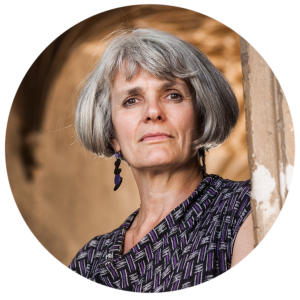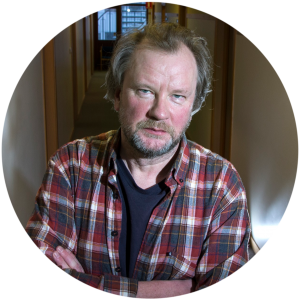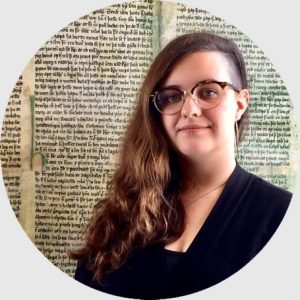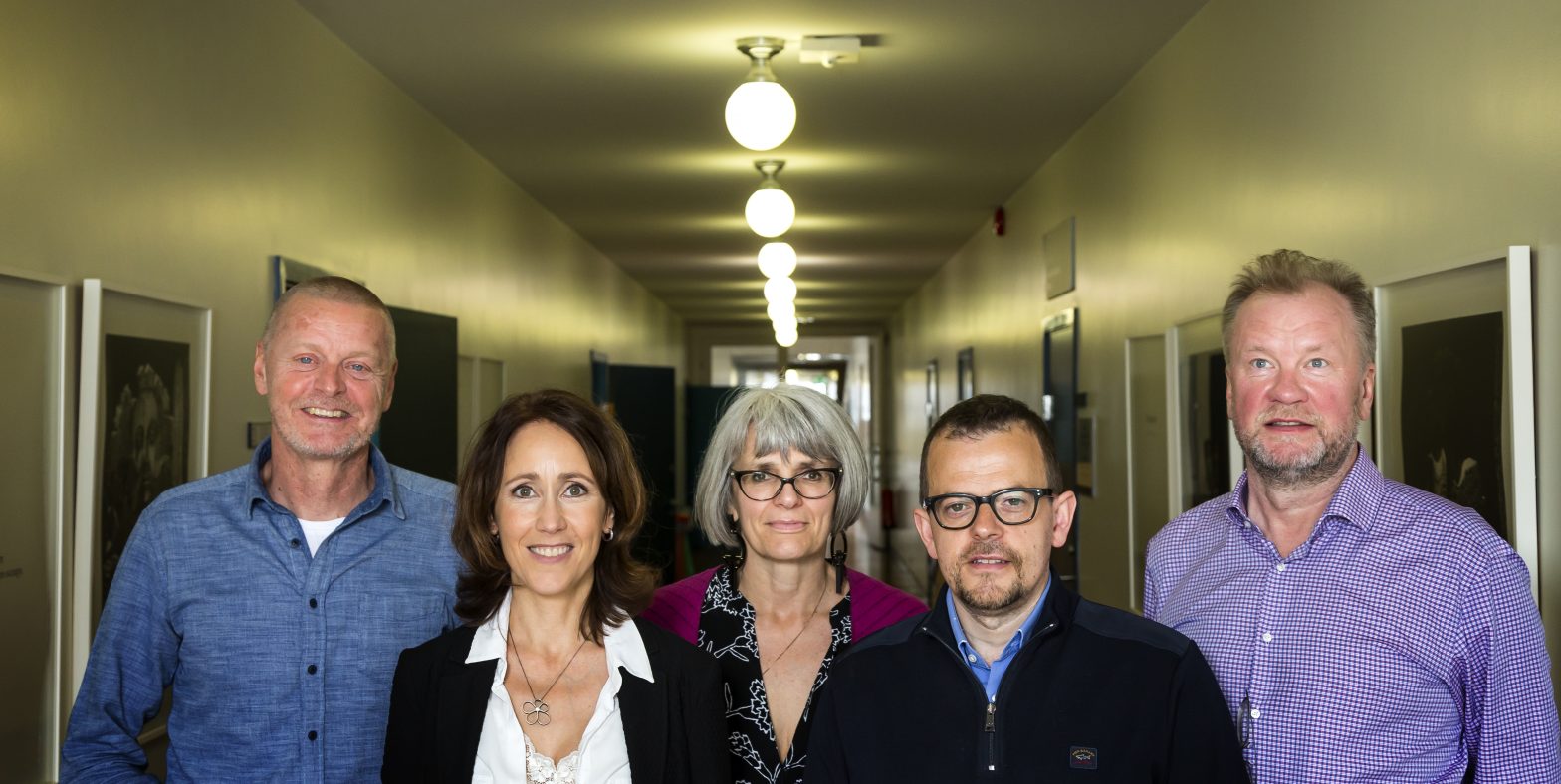 Sif Ríkharðsdóttir (PI) is Professor and Chair of Comparative Literature and Chair of the Institute of Research in Literature and Visual Arts at the University of Iceland. She is the author of Medieval Translations and Cultural Discourse: The Movement of Texts in England, France and Scandinavia (2012) and Emotion in Old Norse: Translations, Voices, Contexts (2017). She has published widely on medieval European literature, most recently on literary emotionality and the history of emotion, cultural encounters, medieval romance, translation theory, literary history and world literature.
Sif Ríkharðsdóttir (PI) is Professor and Chair of Comparative Literature and Chair of the Institute of Research in Literature and Visual Arts at the University of Iceland. She is the author of Medieval Translations and Cultural Discourse: The Movement of Texts in England, France and Scandinavia (2012) and Emotion in Old Norse: Translations, Voices, Contexts (2017). She has published widely on medieval European literature, most recently on literary emotionality and the history of emotion, cultural encounters, medieval romance, translation theory, literary history and world literature.
She is a series editor of Studies in Old Norse Literature (Boydell & Brewer) with Carolyne Larrington and recently published the essay collection A Critical Companion to Old Norse Literary Genre (2020) with two of the team members of the project, Carolyne Larrington and Massimiliano Bampi. She is currently working on a text edition of the Middle English romance Partonope of Blois, co-edited with David Lawton, and a co-edited volume on Charlemagne in the Norse and Celtic Worlds with Helen Fulton in connection with an international research project on Charlemagne in Europe (PI: Marianne Ailes) that was funded by the Leverhulme Trust.
For further information see: http://uni.hi.is/sifr/
 Carolyne Larrington is Professor of Medieval European Literature at the University of Oxford and an Official Fellow and Tutor in Medieval English at St John’s College. Her main research areas are Old Norse-Icelandic literature and European Arthurian literature, as well as medievalism topics. She has a particular interest in emotion in medieval literature and is currently writing a monograph on emotion in Middle English literature. Her most recent relevant book is Brothers and Sisters in Medieval European Literature (2015), and she has published a number of articles on sibling and other kinds of emotion in Middle English and Old Norse-Icelandic literature. In 2016 she was a Distinguished International Visitor at the Centre for the History of Emotions project at the University of Western Australia.
Carolyne Larrington is Professor of Medieval European Literature at the University of Oxford and an Official Fellow and Tutor in Medieval English at St John’s College. Her main research areas are Old Norse-Icelandic literature and European Arthurian literature, as well as medievalism topics. She has a particular interest in emotion in medieval literature and is currently writing a monograph on emotion in Middle English literature. Her most recent relevant book is Brothers and Sisters in Medieval European Literature (2015), and she has published a number of articles on sibling and other kinds of emotion in Middle English and Old Norse-Icelandic literature. In 2016 she was a Distinguished International Visitor at the Centre for the History of Emotions project at the University of Western Australia.
 Frank Brandsma is Associate Professor in Comparative Literature at Utrecht University. He is the co-ordinator of the English and bilingual programme in Literary Studies and also teaches in the UU-‘s Liberal Arts programme. His research focuses on narrative techniques in Arthurian romance in verse and prose around 1200, with special attention to the interlace structure, the presentation of spoken words, and the representation and transfer of emotions. With team member Carolyne Larrington and Corinne Saunders, he edited Emotions in Arthurian Romance: Mind – Body – Voice (Boydell & Brewer, 2015). He is currently working, with Bart Besamusca, on The Arthur of the Low Countries, in the series of handbooks published by the U of Wales Press. At the Huygens-ING institute in Amsterdam, he works on a digital edition of the final part of the Middle Dutch Lanceloet in the Lancelot Compilation.
Frank Brandsma is Associate Professor in Comparative Literature at Utrecht University. He is the co-ordinator of the English and bilingual programme in Literary Studies and also teaches in the UU-‘s Liberal Arts programme. His research focuses on narrative techniques in Arthurian romance in verse and prose around 1200, with special attention to the interlace structure, the presentation of spoken words, and the representation and transfer of emotions. With team member Carolyne Larrington and Corinne Saunders, he edited Emotions in Arthurian Romance: Mind – Body – Voice (Boydell & Brewer, 2015). He is currently working, with Bart Besamusca, on The Arthur of the Low Countries, in the series of handbooks published by the U of Wales Press. At the Huygens-ING institute in Amsterdam, he works on a digital edition of the final part of the Middle Dutch Lanceloet in the Lancelot Compilation.
 Þórhallur Eyþórsson is Professor of Linguistics at the University of Iceland. His research focuses on historical linguistics, language variation and change, theoretical approaches to historical syntax, Indo-European linguistics, Old Germanic, Old Norse-Icelandic, Modern Icelandic and Faroese. He has held appointments in linguistics at multiple institutions, including Cornell University, Harvard University, the University of Manchester and the University of Oslo. He was the President of Íslenska málfræðifélagið (The Icelandic Linguistic Society) from 2015 to 2018 and has been the editor of the journal Íslenskt mál og almenn málfræði (Icelandic Language and General Linguistics) since 2018. Select articles include: “Aldrnari,” Gripla 29 (2018), “Three daughters and a funeral: Re-reading the Tune inscription,” Futhark: International Journal of Runic Studies 3 (2012), “Oblique subjects: a common Germanic inheritance,” Language 81 (2005). Recent books include the co-edited volume Approaches to Nordic and Germanic Poetry (2016).
Þórhallur Eyþórsson is Professor of Linguistics at the University of Iceland. His research focuses on historical linguistics, language variation and change, theoretical approaches to historical syntax, Indo-European linguistics, Old Germanic, Old Norse-Icelandic, Modern Icelandic and Faroese. He has held appointments in linguistics at multiple institutions, including Cornell University, Harvard University, the University of Manchester and the University of Oslo. He was the President of Íslenska málfræðifélagið (The Icelandic Linguistic Society) from 2015 to 2018 and has been the editor of the journal Íslenskt mál og almenn málfræði (Icelandic Language and General Linguistics) since 2018. Select articles include: “Aldrnari,” Gripla 29 (2018), “Three daughters and a funeral: Re-reading the Tune inscription,” Futhark: International Journal of Runic Studies 3 (2012), “Oblique subjects: a common Germanic inheritance,” Language 81 (2005). Recent books include the co-edited volume Approaches to Nordic and Germanic Poetry (2016).
 Massimiliano Bampi is Associate Professor of Germanic Philology at Ca’ Foscari University, Venice. He has authored articles and book chapters on a range of aspects of medieval Scandinavian literatures, with a special emphasis on the question of genre definition in saga literature, the reception of courtly literature in medieval Sweden and Denmark, and intertextual reading in medieval manuscripts. He is currently co-editing the volume A Critical Companion to Old Norse literary genre with Sif Ríkharðsdóttir and Carolyne Larrington (Boydell & Brewer) and an essay collection (with Anna Katharina Richter and Regina Jucknies) entitled The Eufemiaviser and the Reception of Courtly Culture in Late Medieval Denmark, which will submitted to the series Beiträge zur Nordischen Philologie (Tübingen-Basel). He is a member of the research programme Modes of Modification. Variation and Change in Medieval Manuscript Culture (funded by Riksbankens Jubileumsfond), in which he investigates the dynamics of texts and genres in manuscript transmission in medieval Scandinavia.
Massimiliano Bampi is Associate Professor of Germanic Philology at Ca’ Foscari University, Venice. He has authored articles and book chapters on a range of aspects of medieval Scandinavian literatures, with a special emphasis on the question of genre definition in saga literature, the reception of courtly literature in medieval Sweden and Denmark, and intertextual reading in medieval manuscripts. He is currently co-editing the volume A Critical Companion to Old Norse literary genre with Sif Ríkharðsdóttir and Carolyne Larrington (Boydell & Brewer) and an essay collection (with Anna Katharina Richter and Regina Jucknies) entitled The Eufemiaviser and the Reception of Courtly Culture in Late Medieval Denmark, which will submitted to the series Beiträge zur Nordischen Philologie (Tübingen-Basel). He is a member of the research programme Modes of Modification. Variation and Change in Medieval Manuscript Culture (funded by Riksbankens Jubileumsfond), in which he investigates the dynamics of texts and genres in manuscript transmission in medieval Scandinavia.
 Timothy Bourns is an SSHRC Postdoctoral Fellow at the University of British Columbia’s Department of English Language and Literatures and a gestafræðimaður (visiting research fellow) at the University of Iceland’s Institute of Literature and Visual Arts. He was previously the project’s postdoctoral researcher, based at the University of Iceland, from September 2019 to August 2021. In February 2018 he completed his doctorate in English at St John’s College, University of Oxford. His thesis demonstrated how animals and humans are interconnected in Old Norse literature, revealing how the categories of ‘animal’ and ‘human’ are both constructed and challenged in a variety of ways. While at Oxford, he also worked as a Lecturer in Old and Middle English, a Sub-Dean at St Edmund Hall, and a Mythology and Folklore Consultant for English Heritage. His current research interests include Old Norse-Icelandic, Arthurian Romance, and Chaucer; he is examining animal and non-human emotionality, ecological metaphors for human emotions, the emotional effects of different environments, material selfhood, and the affective force of objects – expanding emotion studies beyond the human.
Timothy Bourns is an SSHRC Postdoctoral Fellow at the University of British Columbia’s Department of English Language and Literatures and a gestafræðimaður (visiting research fellow) at the University of Iceland’s Institute of Literature and Visual Arts. He was previously the project’s postdoctoral researcher, based at the University of Iceland, from September 2019 to August 2021. In February 2018 he completed his doctorate in English at St John’s College, University of Oxford. His thesis demonstrated how animals and humans are interconnected in Old Norse literature, revealing how the categories of ‘animal’ and ‘human’ are both constructed and challenged in a variety of ways. While at Oxford, he also worked as a Lecturer in Old and Middle English, a Sub-Dean at St Edmund Hall, and a Mythology and Folklore Consultant for English Heritage. His current research interests include Old Norse-Icelandic, Arthurian Romance, and Chaucer; he is examining animal and non-human emotionality, ecological metaphors for human emotions, the emotional effects of different environments, material selfhood, and the affective force of objects – expanding emotion studies beyond the human.
 Caroline R. Batten is an Icelandic Research Fund Postdoctoral Fellow, based at the School of Humanities at the University of Iceland. She completed her doctorate in English literature at the University of Oxford in 2020, where she also served as Stipendiary Lecturer in Medieval English Literature at St Edmund Hall and Trinity College. She earned her BA in English literature from Swarthmore College, and an M.Phil in English literature (650-1550) from the University of Oxford. Her research focuses on the body, gender, and medicine in Old English and Old Norse literature, with a particular emphasis on medical magic, and has appeared in Scandinavian Studies, JEGP, Medium Ævum, and Review of English Studies, among other publications. Her doctoral thesis is the first complete metrical, stylistic, and literary study of the twelve Old English metrical charms, and her work at the University of Iceland will examine the interplay between bodily illness and somatic emotional expression in the Old Norse medical corpus and the Íslendingasögur.
Caroline R. Batten is an Icelandic Research Fund Postdoctoral Fellow, based at the School of Humanities at the University of Iceland. She completed her doctorate in English literature at the University of Oxford in 2020, where she also served as Stipendiary Lecturer in Medieval English Literature at St Edmund Hall and Trinity College. She earned her BA in English literature from Swarthmore College, and an M.Phil in English literature (650-1550) from the University of Oxford. Her research focuses on the body, gender, and medicine in Old English and Old Norse literature, with a particular emphasis on medical magic, and has appeared in Scandinavian Studies, JEGP, Medium Ævum, and Review of English Studies, among other publications. Her doctoral thesis is the first complete metrical, stylistic, and literary study of the twelve Old English metrical charms, and her work at the University of Iceland will examine the interplay between bodily illness and somatic emotional expression in the Old Norse medical corpus and the Íslendingasögur.
 Meritxell Risco de la Torre (mrd4@hi.is) is the project’s doctoral student. She holds a BA in Modern Languages and Literature (German and English) from the University of Barcelona and an MA in Viking and Medieval Norse Studies from the University of Iceland. For her MA thesis, completed in May 2019, she analysed the plot of Laxdæla saga in terms of its narrative development through the depiction of emotions and emotional display. The aim of the analysis was to argue that the emotional world of the central character, Guðrún Ósvífrsdóttir, is essential to both the narrative development and its circular narrative disposition. Her doctoral research project seeks to examine different topoi of emotive performativity and their linguistic and literary features in a cross-generic dimension. The overall aim is to assess whether there is a connection between the manner in which emotion is performed and the gender of the characters in several genres, and what the implications of gender-bound performances may be for the concept of selfhood.
Meritxell Risco de la Torre (mrd4@hi.is) is the project’s doctoral student. She holds a BA in Modern Languages and Literature (German and English) from the University of Barcelona and an MA in Viking and Medieval Norse Studies from the University of Iceland. For her MA thesis, completed in May 2019, she analysed the plot of Laxdæla saga in terms of its narrative development through the depiction of emotions and emotional display. The aim of the analysis was to argue that the emotional world of the central character, Guðrún Ósvífrsdóttir, is essential to both the narrative development and its circular narrative disposition. Her doctoral research project seeks to examine different topoi of emotive performativity and their linguistic and literary features in a cross-generic dimension. The overall aim is to assess whether there is a connection between the manner in which emotion is performed and the gender of the characters in several genres, and what the implications of gender-bound performances may be for the concept of selfhood.
 Bridget C. Leary is one of the project’s MA students. She holds a BA in Classics from University College London and is currently working on her MA thesis for the Viking and Medieval Norse Studies programme at the University of Iceland. Her thesis will analyse emotionality in the poem Sonatorrek when removed from the narrative of Egils saga in which it is now typically embedded. Her work will compare emotive scripting in the poem with other examples from the thirteenth-century emotive canon, and use the resulting evaluation as an inroad into the controversy around the date of the poem’s original composition. Her overall aim is to assess the implications that placing the poem’s composition in a thirteenth-century context would have for understandings of medieval self and identity both constructed (through the poem) and revealed (through the process of construction).
Bridget C. Leary is one of the project’s MA students. She holds a BA in Classics from University College London and is currently working on her MA thesis for the Viking and Medieval Norse Studies programme at the University of Iceland. Her thesis will analyse emotionality in the poem Sonatorrek when removed from the narrative of Egils saga in which it is now typically embedded. Her work will compare emotive scripting in the poem with other examples from the thirteenth-century emotive canon, and use the resulting evaluation as an inroad into the controversy around the date of the poem’s original composition. Her overall aim is to assess the implications that placing the poem’s composition in a thirteenth-century context would have for understandings of medieval self and identity both constructed (through the poem) and revealed (through the process of construction).
 Maximillian Jesiolowski is an MA student in the Viking and Medieval Norse Studies program at the University of Iceland and holds a bachelor’s degree in Archaeology and Ancient History from Monash University in Australia, with minors in Music and History. For his MA thesis, he aims to examine emotional states and communal and individual identities in Grettis saga Ásmundarsonar and how these concepts are reflected in the portrayal of landscape and natural environment in the saga.
Maximillian Jesiolowski is an MA student in the Viking and Medieval Norse Studies program at the University of Iceland and holds a bachelor’s degree in Archaeology and Ancient History from Monash University in Australia, with minors in Music and History. For his MA thesis, he aims to examine emotional states and communal and individual identities in Grettis saga Ásmundarsonar and how these concepts are reflected in the portrayal of landscape and natural environment in the saga.

